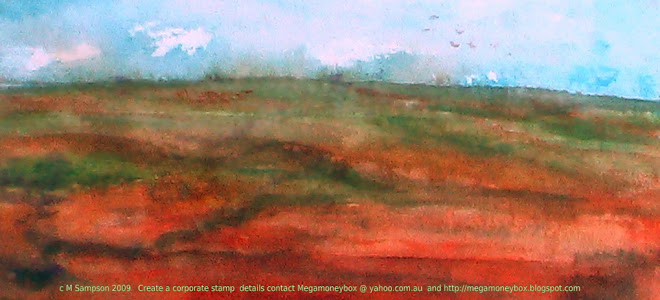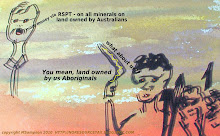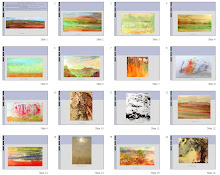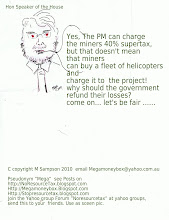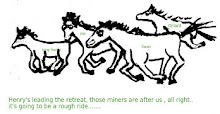article from the Australian today
KEVIN Rudd is refusing to budge on his super-profits tax after global miner Xstrata suspended $586 million worth of investment in Queensland yesterday, threatening 3250 jobs and triggering calls from Premier Anna Bligh and mining, business and union leaders to start genuine talks and compromise.
The sudden announcement to suspend further investment on the Wandoan thermal coal project and the Ernest Henry copper mine because of the fears over the resource super-profits tax dramatically increased the stakes in the tax war between the Rudd government and the miners because jobs are now at risk.
"Those people who got job termination notices today, this is no longer a war of words," Ms Bligh said yesterday. "This is causing real pain to Queensland families."
Xstrata yesterday cancelled 60 contract jobs after immediately suspending a $400m underground expansion of the Ernest Henry copper mine in northwest Queensland. It had planned to employ 190 people on the project. About $186m worth of work on the $6bn Wandoan mine and other coal projects in the centre of the state have also been suspended. Xstrata said the two projects would have created 3250 jobs, which were now "at risk".
Start of sidebar. Skip to end of sidebar.
Related CoverageTRADE: Minerals drive surplus
XSTRATA: Numbers don't add up for employees
HENRY ERGAS: Going retro with cash grab
IN DEPTH: Henry Tax Review
Rudd's claws out on mining tax Courier Mail, 1 hour ago
Rudd wrong on $6bn venture: Xstrata The Australian, 4 hours ago
Don't believe miners on tax, PM warns The Australian, 5 hours ago
Tax 'will cost Queensland $2.5bn' Courier Mail, 6 hours ago
Xstrata in warning over $6bn coal project Daily Telegraph, 8 hours ago
.End of sidebar. Return to start of sidebar.
Xstrata Coal chief executive Peter Freyberg said the decision was difficult. "This is devastating for the people involved, teams of people I have had working on it for several years - to have that all blown away as a result of a tax we have not seen, where the numbers and the models used is inappropriate for our industry is highly problematic," he said.
The mining sector is running a campaign against the tax and has delayed billions of dollars worth of projects. Yesterday's announcement was the first to directly affect mining jobs, although the tax is also affecting the value of mining companies listed on the stock exchange and held by investors, including superannuation funds.
One of the world's biggest resource fund managers revealed yesterday it had sold down a quarter of its BHP and Rio Tinto holdings because of the proposed tax.
JPMorgan Chase's Ian Henderson said Rio had been his biggest investment, about 4.5 per cent of the $US7 billion ($8.2bn) of resource assets under his control, but he had reduced his holding by about $US100 million. He also made a "reasonably significant" reduction in his holdings of iron ore miner Fortescue, but the JPMorgan funds had increased their stakes in goldminers.
"I'm sorry to say we've reduced our Australian exposure," Mr Henderson told Bloomberg. "I had not thought that the changes in Australia would be quite as drastic as they are proposed to be."
JPMorgan's chairman in Australia and New Zealand is Rod Eddington, a Rio director who this week added his voice to calls for the Prime Minister to restart negotiations with the industry.
Although Mr Rudd declared the government would not be pushed around by the industry, he said he was listening to calls for changes in negotiations for the tax. And Resources Minister Martin Ferguson said the mining companies and the government now agreed the debate was really about "how much tax is collected, how it's collected and who collects it".
Ms Bligh called for the Rudd government and miners to "get on with solving" the dispute over the 40 per cent tax on resource super profits. "I would urge both the federal government and the mining companies to get around the table, put down the baseball bats, stop the advertising and get on with solving it," she said. Australian Workers Union leader Paul Howes, whose union has funded advertising supporting the tax and attacking mining industry bosses, said last night Xstrata was a "good employer" but on this occasion, "I smell a rat and think they may have been led into an ideological argument". "It's a pretty ugly move and I don't believe it's because of the RSPT," Mr Howes said.
But he said it would be best for both sides to negotiate in "a cool and calm atmosphere".
"There's a case for everyone to take a step back and have some proper negotiations," he said.
Last night, Mr Freyberg slapped down the suggestion that suspension of the Queensland projects was a tactical ploy by the company in the mining industry's campaign against the tax. He said that after crunching the numbers on the tax, Xstrata had concluded that net profit from the new mine at Wandoan would fall from nearly $500m to "near zero".
Xstrata chief executive Mick Davis said the tax had "created significant uncertainty for the future of mining investment into Australia and would impair the value of previously approved projects and exploration to the point that continued investment can no longer be justified".
BHP Billiton chief executive Marius Kloppers also called last night for the government to change the terms of negotiations to avoid "massive unintended consequences" of the mining tax.
Infrastructure Australia head Rod Eddington, who advises the Prime Minister; the chairman of Qantas, Leigh Clifford; and the Business Council of Australia have also called on the government to enter serious negotiations on the new tax.
But Mr Rudd told parliament the government would not be bullied. "This government will not be intimidated by the statements of any mining company, foreign or domestic," he said, accusing the opposition of taking funding from the industry. "This government does not stand here as the puppet of parts of the mining industry, as those opposite do; this government stands here to act in the national interest on behalf of all Australians."
skip to main |
skip to sidebar

Julia's portrait for the PM Hall
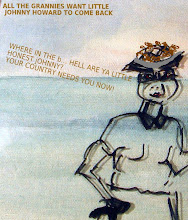
Where in the B..Hell are you Johnny?
Twitter
We have to link together like an internet cobweb. The More spiders the better
What you can do besides writing to editors, politicians, and speaking up, is to become followers on as many blogs and forums and twitter sites which oppose the Resource Super profit Tax, as possible. If you forward information on the tax to as many people as possible, you will raise awareness. This tax is unconstitutional, and PRRT contains secrecy clauses, which means if you were a "whistleblower" you could be liable for $10,000 fine and or 2 years jail. Worse still, you could not present any documents relating to that company to the court.
When you become a follower, you help raise the status of the campaign. You can Email our cartoons, or pics. use them as screensavers and as an opportunity to raise the Supertax issue. Respect our efforts by adding our links, and giving credit for our volunteered work.
When you become a follower, you help raise the status of the campaign. You can Email our cartoons, or pics. use them as screensavers and as an opportunity to raise the Supertax issue. Respect our efforts by adding our links, and giving credit for our volunteered work.
Julia PM -barring all

Julia's portrait for the PM Hall
Welcome! to my Election Blog
This blog is written and authorised by NSW senate candidate Megan Sampson Wollongong (silent elector address)
My main election blog is at Http://megansampson.blogspot.com
you can email me at msmegansampson at gmail dot com
Get to know more..
see my other blogs at
Http://msmegansampson.blogspot.com
http://megamoneybox.blogspot.com
http://reduceyouruse.blogspot.com
http://cutcarbonuse.blogspot.com
http://www.permculturevisions.com
My main election blog is at Http://megansampson.blogspot.com
you can email me at msmegansampson at gmail dot com
Get to know more..
see my other blogs at
Http://msmegansampson.blogspot.com
http://megamoneybox.blogspot.com
http://reduceyouruse.blogspot.com
http://cutcarbonuse.blogspot.com
http://www.permculturevisions.com
Vote for Megan Sampson in NSW senate.Col K.
Make your own solar panels!
All the grannies want Little Johnny Howard back

Where in the B..Hell are you Johnny?
Join the Noreourcetax forum at Yahoo
Flinders ranges. Our art is for sale. suport the campaign
Share market tips and our blogs
Followers
Blog Archive
-
▼
2010
(36)
-
▼
June
(16)
- so now the greens want the RSPT.. anything for lab...
- Is this how it will pan out? divide and conquer?
- Don't cave in.. the election is nigh. RSPT must be...
- twiggy didnt cave in.. and Gillard gets top job.
- so is this the answer??
- australia -chinese deal announced today?!?
- What does twiggy know taht we don't?
- The PM. 1+ 1 = 1000, or a 1,000,000 The multiplier...
- the battle continues.
- the bigger picture
- BHP slams RSPT
- don't get sucked in...
- Don't get sucked in, with promises see the legisla...
- Q + A if an election was held today
- re more news from "the Australian" - Xstrata
- news item list
-
▼
June
(16)
